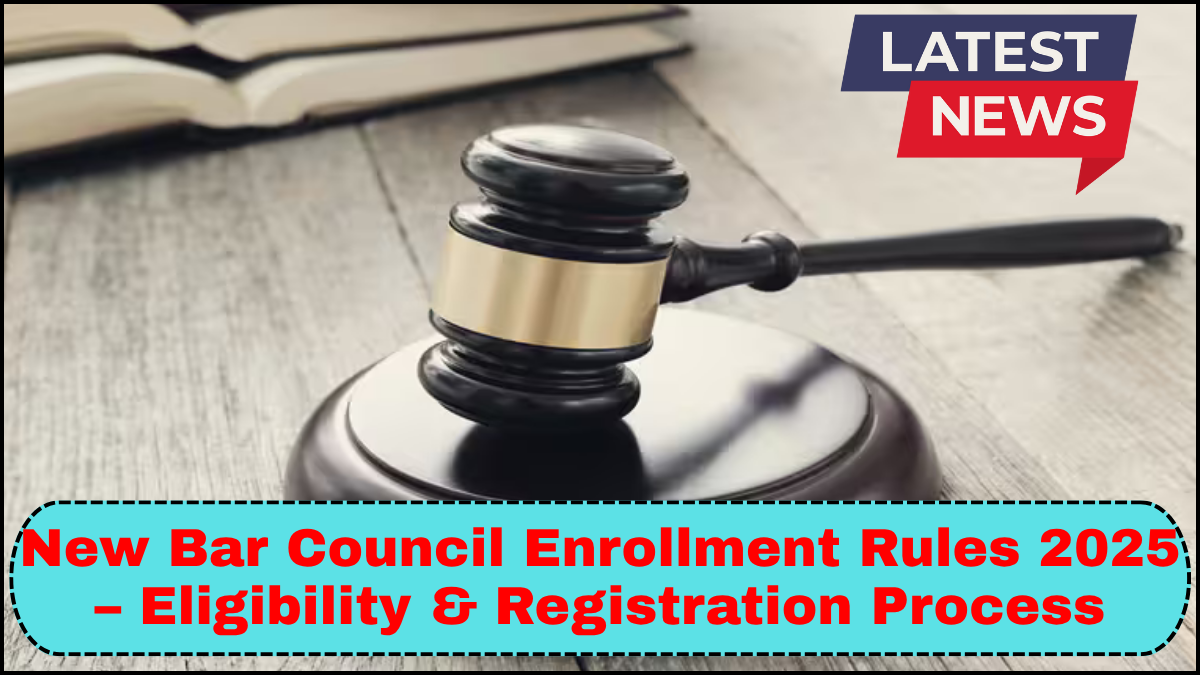The New Bar Council Enrollment Rules 2025 have introduced substantial changes to how aspiring lawyers enter the legal profession in India. These updated regulations aim to elevate professional standards, streamline the lawyer registration process, and ensure that only well-qualified candidates are licensed to practice law.
Below, we break down everything you need to know—eligibility criteria, application steps, and key changes—to help you navigate the revised framework confidently.

What Are the New Bar Council Enrollment Rules 2025?
The New Bar Council Enrollment Rules 2025 are the latest regulations enacted by the Bar Council of India (BCI) to reform the enrollment and licensing process for legal practitioners. These rules replace earlier provisions under the Advocates Act, 1961 and are aimed at improving the quality of legal representation and eliminating procedural loopholes in the lawyer registration process.
This overhaul reflects a strong push towards merit-based admissions and enhanced accountability from both law graduates and law institutions.
Key Changes in Eligibility Criteria
1. Minimum Educational Qualifications Tightened
Under the new rules:
-
Candidates must have completed a full-time, regular law degree (LL.B) from a BCI-approved institution.
-
Distance education or part-time law degrees will no longer be accepted for enrollment.
-
Integrated 5-year and 3-year law programs remain valid only if pursued from recognized colleges.
This move is designed to curb the proliferation of low-quality legal education and emphasize academic rigor.
2. Mandatory Practical Training
A significant eligibility change is the inclusion of compulsory clinical legal education. Candidates must now complete:
-
A six-month internship with a senior advocate (with a minimum of 10 years of standing), or
-
A judicial clerkship, recognized by the respective state Bar Council.
The goal is to ensure that law graduates enter the field with real-world experience—not just textbook knowledge.
3. Character and Conduct Verification
Before granting enrollment, Bar Councils will now conduct:
-
A police verification of character,
-
An affidavit on the candidate’s past conduct and academic integrity.
Applicants with a record of serious academic misconduct or criminal behavior may face rejection.
Lawyer Registration Process Under the 2025 Rules
Step 1: Pre-Enrollment Verification
Candidates must submit:
-
Law degree certificate and transcripts
-
Internship or clerkship completion certificate
-
Proof of BCI-recognized institution
-
Character certificate from the law college
-
Affidavit of integrity
Step 2: Apply to State Bar Council
The application must be submitted digitally through the state’s Bar Council portal. Hard copies may be required for verification later.
Step 3: Pay Enrollment Fee
The updated fee structure under the new Bar Council enrollment rules 2025 varies slightly across states but typically includes:
-
Application fee
-
Welfare fund contribution
-
Identity card issuance fee
Total costs may range from ₹12,000 to ₹20,000 depending on the state.
Step 4: Sit for the All India Bar Examination (AIBE)
After provisional enrollment, candidates must clear the AIBE to receive a Certificate of Practice. The AIBE tests practical legal skills and basic knowledge of law.
Step 5: Get Permanent Enrollment Certificate
Only candidates who pass the AIBE and fulfill all other criteria will receive their permanent license to practice law in India.
Impact of the New Rules
These reforms emphasize quality over quantity. By raising the bar for legal education and enforcing a stricter lawyer registration process, the Bar Council seeks to eliminate fraudulent enrollments and reduce the number of underprepared practitioners.
Law colleges are now under pressure to deliver better legal training, while students are incentivized to gain hands-on experience before applying.
FAQs on New Bar Council Enrollment Rules 2025
Q1. Can students from distance learning law programs enroll under the 2025 rules?
A: No. The new rules strictly prohibit enrollment of graduates from distance or part-time law programs.
Q2. Is the AIBE still required after the 2025 enrollment changes?
A: Yes. Passing the AIBE remains mandatory to obtain a Certificate of Practice after provisional enrollment.
Q3. How does the internship requirement work?
A: Law graduates must complete a certified six-month internship under a senior advocate or judicial clerkship before applying.
Q4. What happens if a candidate fails the character verification?
A: Enrollment may be denied if the candidate is found to have engaged in serious misconduct or has a criminal record.
Q5. Are foreign law graduates eligible under the new rules?
A: Only if their degree is recognized by the BCI and they meet all other eligibility criteria, including internship and AIBE.
click here to learn more